CASA PROFILES
WELCOME
IMPACT NEWS
PROFILES
SERVICE
SUPPORTERS
FINANCIALS
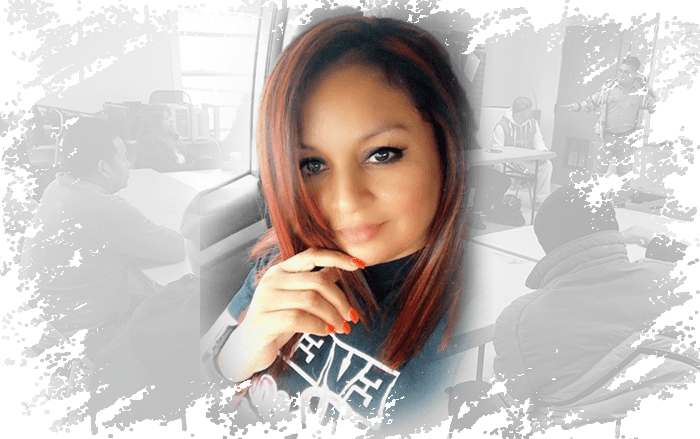
Claudia
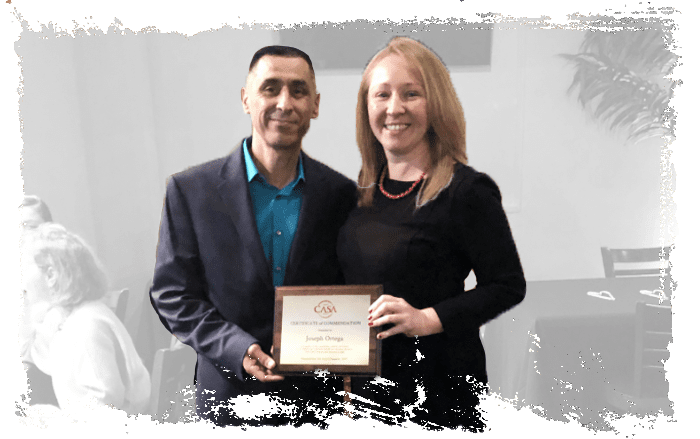
Joseph
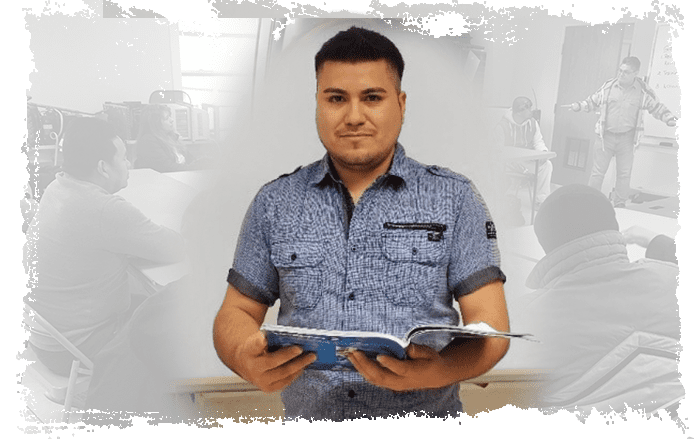
William
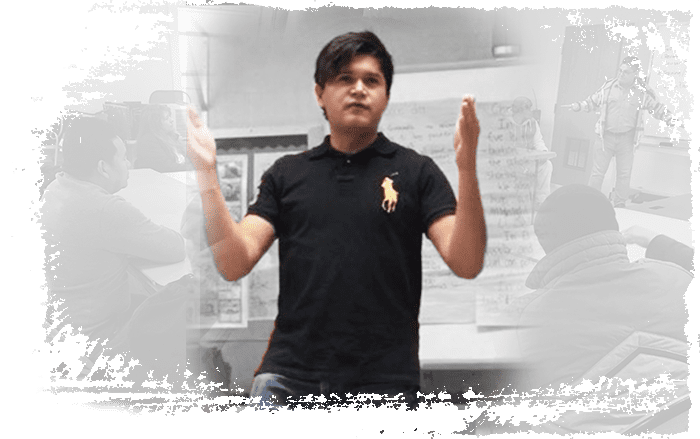
Felix
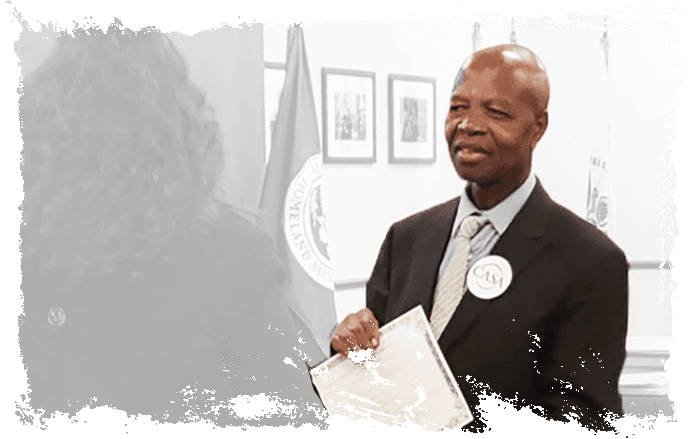
Henry

Arlette
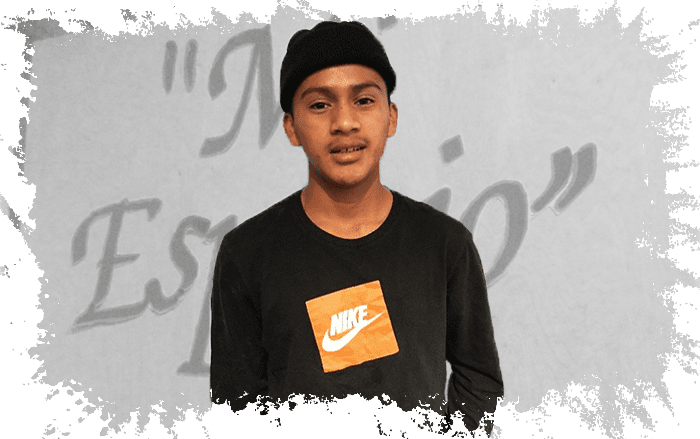
Ander
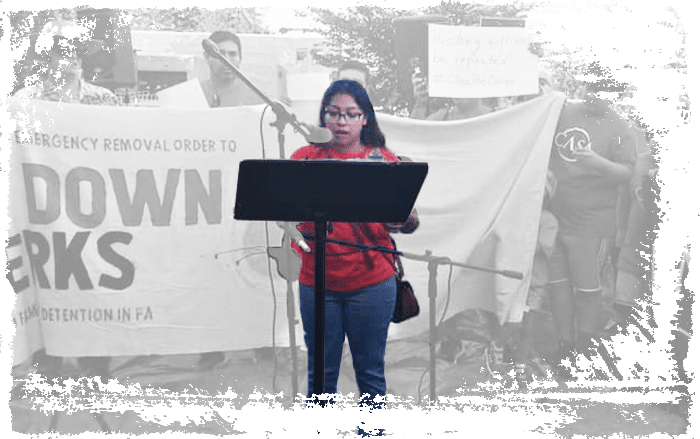
Yatciri
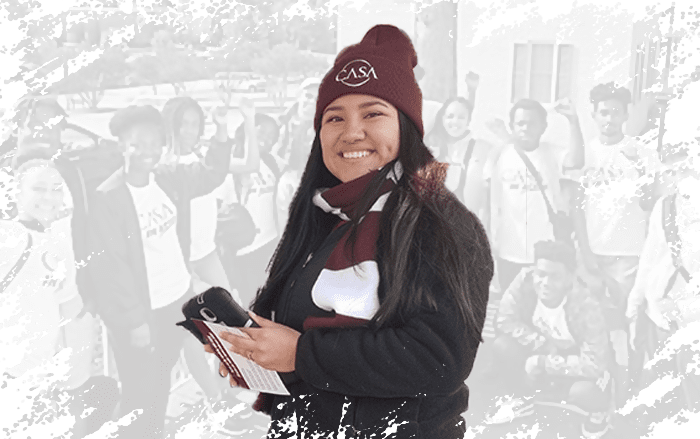
Mitzi
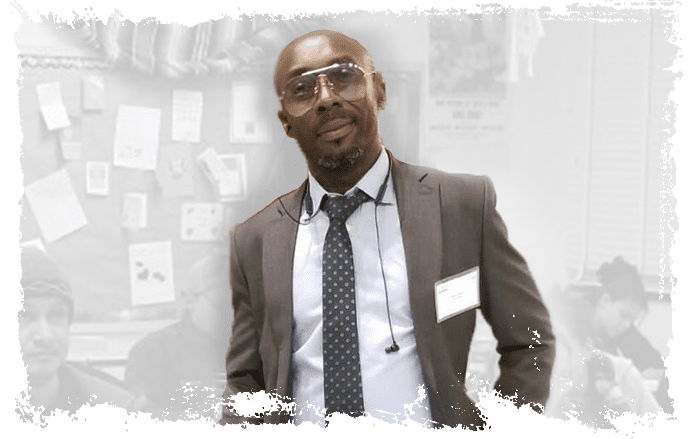
Aime
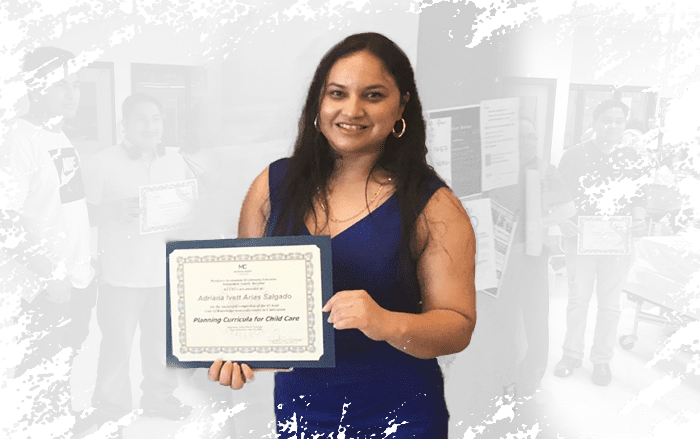
Ardiana

Claudia
Claudia left her home country of El Salvador nineteen years ago in search of education and employment opportunities. She lived with her sister in an area where it seemed that everyone spoke English but her. She was impressed by how friendly her new neighbors were. It seemed as though everyone smiled or waved at her. Claudia’s sister helped make the transition fun by taking her shopping, sightseeing and to her first buffet.
After three months, Claudia got a job at McDonald’s where she worked for the next nine years before taking a position at CVS. At work, she lacked confidence when interacting with English speaking coworkers and customers. In her personal life, she continued to rely on her sister whenever she needed to get something done. Then this fall, Claudia decided to enroll in her first English class so that she could become more independent and financially stable. She was ready to work towards her goal of earning a GED and wanted to prove to her young daughter that she was capable of accomplishing anything. So far, Claudia has really enjoyed her class, saying “I couldn’t stop laughing when we played the telephone game.” Another favorite has been the paper ball game in which everyone shares their ideas by writing them on small sheets of paper that are then crumpled into a big ball and thrown around the classroom to determine who reads whose thought out loud. But the class is not just fun. Claudia has also learned many practical skills such as how to fill out a job application and successfully complete an interview.
Her confidence has grown and she recently attended her daughters parent-teacher conference without relying solely on the support of an interpreter as she had in the past. As her English improves, Claudia’s other long-term goals such as taking a computer course and passing the GED test appear closer to becoming a reality. From there, she hopes to continue her education by enrolling in Montgomery College.
Joseph Ortega began teaching with CASA’s Life Skills ESOL Program in 2008. Since then, he has supported approximately 900 members towards their goal of English proficiency. Over the years Joseph has facilitated evening classes across a variety of course levels, all while working full-time outside of CASA. He quickly earned a reputation as an outstanding instructor who members requested by name when they came to enroll in ESOL classes.
In 2017 he helped pilot Saturday classes. Thanks to his support, these classes are now a popular and expanding offering of the program for those who would otherwise be unable to access ESOL services due to their intensive work schedules. During his eleven years as a teacher, Joseph has been very intentional in incorporating information about CASA’s other services into his lesson plans in a sincere effort to improve the overall quality of life for all those attending his classes. When teaching a lesson on communication with a healthcare professional, Joseph made sure that students were aware of CASA’s health hotline. When teaching a lesson on conducting an effective job search, Joseph told students about CASA’s Welcome Centers and Vocational Training Program. He enthusiastically recruited students to participate in CASA actions and often times participated himself.
Joseph has also tirelessly supported the CASA’s ESOL staff in recruiting new students to the program by making hundreds of reminder calls to community members in the days leading up to registration and then being the last teacher to leave at the end of each registration event. The ripple effect of his selfless service will be felt not only by his students, but by their families and friends for years to come and he has played a vital role in the achievement of their individual successes.

Joseph

William
How long have you lived in the United States?
I have lived in the U.S. for about 4 years and a half
What do you like about living in the U.S.A.?
The US is a much safer place than in my country Guatemala. There is also more stability here and there are new opportunities every day, you just have to look for them.
What do you find challenging?
Language is always a barrier, you can’t always finish what you started or set yourself off to accomplish, sometimes you find out that language becomes an obstacle.
What do you miss from back home in your native country?
I feel that although my country (Guatemala) may not always be the safest, somehow you have more freedom to do things that you can’t always accomplish in this country because of language or your legal status.
Why did you decide to come live in the United States?
I decided to come to this country seeking a better style of life, it is too dangerous in my country, and you aren’t able to have all the success that you desire for yourself or your family.
Describe your experience coming to the United States.
My first reaction was that of pure joy, but at the same time, I felt a lot of stress and anxiety. Not having any grasp of the language made it truly scary. The physical journey to get here was perhaps the worst experience of my life, one that I would not want to be faced with again.
What was your life like when you first arrived in the United States?
My first day was the best day of my life, since I had not seen my brothers for about 8 to 10 years. Unlike some people I know, it was definitely good to not have to worry about what I was going or if I was going to eat or even where I was going to sleep. Some people aren’t as fortunate as I was, so I county my blessings.
How was it different from the life you had in your native country?
The biggest difference was going from being a burden for my parents to being a financial asset for them.
How is it different from your life now?
When I first arrived, no one would hire me, a newly arrived individual, I didn’t have much or any experience. But somehow, after working to improve myself as much as I could, I went from living with my family to being able to rent my own place to live. I also don’t have to struggle with figuring out how to ride the bus or other forms of public transportation, I now also have my own car. This is a big advantage.
Do you work?
In the United States I have worked remodeling homes, and in my country I mainly did agricultural work, I didn’t get a chance to study as much as I wanted to. Mostly I did, a lot of planting and harvesting.
Why did you decide to take English classes?
I discovered that someone with English skills has more or better opportunities in this country.
How has learning English affected your life here in the United States?
I am now able to defend myself at work, I understand things better.
What do you like at CASA’s English classes?
I have been at CASA for 2 sessions. What I like about this program, is that the learning here is much more fluid. The teachers are sincere and it is evident that they care about the students. The teachers aren’t just there teaching they are involved with our learning. They take a much personal approach and take the time to get to know us and our needs.
Felix left his home country of El Salvador 17 years ago to search for better economic and social opportunities. After completing 9th grade in his country, he was unable to financially afford his studies. Therefore, he came to Maryland hoping to achieve the American Dream. At first when he arrived, he faced the language barrier and his inability to communicate made it difficult to understand the United States’ culture. In addition, he missed his family, friends, and his home country.
In El Salvador, Felix came from a low-income household. When he started high school in El Salvador, the school asked for books, fees, and materials his family could not afford. Once he arrived at the United States, he had many hopes and expectations of the United States and began searching for opportunities. He found opportunities at work and the ability to study English. He started working in construction and found organizations to help him advance his goals. He became introduced to CASA in the early 2000s. He volunteered with the immigration organizing team and helped make phone calls and partake in protests.
Years later, Felix took English classes with CASA’s ESOL program. He decided to take classes because he had trouble communicating at work and in his extracurricular activities. A friend of him introduced him to the ESOL program and he received a scholarship at CASA to be able to take his first class seven years ago. Now, Felix completed level 4B and his English has helped improved his conditions in many ways. Felix has found better work opportunities and is a currently a labor union organizer. He feels that his English has helped him in the workplace, community, communicate with his children, and much more. He appreciates the opportunities that CASA provides for immigrant communities. He stated, “CASA has been a strong advocate for our communities and English classes has been important to me to learn about U.S. culture. These opportunities help our community gain more knowledge.” Felix plans to enroll in a GED program after finishing up his course and hopes to continue his education to find even more opportunities!

Felix

Henry
CASA serves over 1,200 green card holders every year pursuing their dream of becoming a US citizen. We provide the full spectrum of services a Legal Permanent Resident (green card holder or ‘LPR’) may need to have a successful application: from in-house immigration attorneys, to support completing the naturalization form, classes to prepare for the Civic and History test, to financial support to afford the process. Henry is one of the members we helped this year. He came from Liberia and applied to become a US citizen the very same day he became eligible to do so. CASA was able to help Henry afford the process by helping him through the financial support process in Montgomery County, MD and Henry received a $300 scholarship to cover his costs. The day of the Oath Ceremony, Henry arrived with a CASA pin in his suit.
Henry is very committed to promote changes in immigration policy to help other immigrants. Indeed, he participated in a Press Conference in May 2019 at the MCC with representatives of Chirla, NPNA, and CASA to oppose the administration’s “Public Charge” rule.
Arlette is a 17 year old high school student in York, Pennsylvania, born in Puebla, Mexico who arrived in the U.S. when she was two years old. Arlette first got involved with CASA when she was 14, joining her parents in CASA campaigns to make York a Welcoming City and stop police-ICE collaboration. Arlette was immediately hooked! She continued to work with CASA’s organizing team, rapidly developing leadership skills that have made her into one of the community’s brightest youth leaders.
She participated in several leadership workshops, was interviewed by The New York Times in support of the DREAM Act, and spoke passionately against family separation policies at a rally with the PA Democratic Caucus. Arlette even represented CASA speaking at a rally in front of the White House in response to the President’s declaration of a “State of Emergency” at the southern border. Through her advocacy with CASA, Arlette says she has learned to be proud of being an immigrant, to speak for what she believes is right, and to always keep fighting.

Arlette

Ander
CASA launched a new pilot Internship Program last summer as part of the Mi Espacio program where high-school students like 17-year old Guatemalan native and aspiring filmmaker Anders had the opportunity to intern at a company or organizations of interest.
When Ander first came to the U.S. in 2014 to reunite with his mother and brother, he had a hard time adapting. “I know that the only way to achieve your dreams is by working hard and applying yourself,” Anders said, but despite his best efforts, he encountered road blocks almost immediately – he did not know the language and as a result he struggled in his new school. But when a school guidance counselor told Ander about CASA’s Mi Espacio program, he saw an opportunity to get involved with the community, improve his grades, and be involved in fun learning activities during school breaks.
As an aspiring filmmaker, Ander had always enjoyed making videos and graphics as a hobby, and learning what he could from videos on the web, but the Mi Espacio Internship Program gave Ander the chance to learn from professionals who could help him improve his skills. He jumped at the chance to sign up for an 80-hour internship experience here at CASA’s Multicultural Center in the Communication Department.
During his internship experience, Ander was able to further develop his graphic editing and video skills to run CASA’s Facebook account at events. Ander took photos, participated in a radio show interview, and learned to use social media tools like Facebook Live to tell compelling stories.
Mi Espacio’s internship helped Ander grow and learn new skills. He enjoyed his internship, and wants to continue building his portfolio in making videos and graphics, and expand into photography.
My name is Yatciri Cruz, I am 18 years old. I have been here since 2000 and have been a CASA member since 2018.
I am originally from Mexico and have been here for about 18 years now. The amount of sacrifices my family and I have had to make are countless, due to the failure of leaders in this country to fix our broken immigration system. Still, I’m striving to succeed. I am currently a high school senior, dual enrolled with HACC, and work. My goal is to be able to continue school and working to eventually become an RN (a Registered Nurse).
I never knew I was undocumented until DACA was enacted in 2012 by former president Barack Obama. I remember my parents talking to me about applying for my brother and later then putting through an application for me once I turned 15. That is when my struggles at school and with friends later began, since I felt like I couldn’t tell people about my status. Even though I am a DACA recipient now, the fear is still there… just as it is for millions of undocumented immigrants in this country. DACA doesn’t give me permanent legal status just deportation protection and a work permit that I have to apply to renew every two years. Nothing is certain for us, nothing is secure for us. Junior and Senior year of high school are supposed to be the years we as students look at colleges, do college visits, and apply. But because of my immigration status there was so much I was held back from doing such as apply for certain scholarships, and certain financial aid help for college.
I know I am not the only one who has to go through the fear of being deported, the feeling of being denied or not being eligible for opportunities. Everyday with the fear of “What if…?” We are here to work. We are here for a better life. To succeed and become somebody, to make a difference. We are not “drug dealers.” We are not here to “steal jobs”, we ARE paying taxes!
Taxes that are going to be used to pay for this wall. And I know.. Parents, you have sacrificed it all for your children, for a better future for them. For them to have the opportunities and things you weren’t able to have. I see it in my parents every day. We all work hard to put a roof over our heads and a plate of food on the table. We all work so hard to have a better life. This is the reality, that this wall isn’t going to stop drug trafficking, or “criminals” from coming. It is going to stop hard working families that want a better life like mine.
Therefore, the emergency is not just at the border, it is here in Harrisburg and in all our communities all over the country, where students like me wonder every day if mom and dad will come home at the end of the day. The emergency is in DC, where our democracy is under attack. In high school government class, we learn three branches of government. So even if I was not born here and I am only 18 years old, it is pretty clear to me that the president is not respecting the basic principles our country and our democracy was founded on. So, I am here to urge our elected leaders in Congress to make sure we maintain the balance of power set out by the Constitution and speak out against President Trump’s gross overreach. Just like we all are doing right here, right now! Thanks so much! Si se puede!

Yatciri

Mitzi
And Mitzi Colin, a DACA recipient from Chester County, has taken it upon herself to start a new Youth Comite with her fellow students at West Chester University.
Mitzi is twenty years old. She is a DACA recipient and studies Political Science at West Chester University. She immigrated from Mexico with her mom at the age of 3 and they moved to Coatsville, PA, where she has lived ever since. The idea of losing DACA has made her realize how much she has at stake. Mitzi is fully committed not just to win DACA at the Supreme Court but also pass a clean DREAM Act. She is new in CASA but in this short time she has shared her story during a Home is Here event on 3 November in Kennett Square. She also co-leads the youth committee in Kennett Square, a group of CASA activists that focus on racial and climate justice.
Aime is from Cameroon and has been a member of CASA since 2017. He is a day laborer and worked as a journalist in Cameroon. When he arrived in Maryland, Aime was introduced to CASA by his roommates and since then has been coming to CASA in search of jobs earning between $12.00 to $15.00 to support himself and his family back in Cameroon.
Aime learned about our CASA Vocational Training program, but because of money issues, could not take classes until he learned that CASA was offering scholarships to very low-income members. Amie applied for a 50% scholarship so he could take a Building Maintenance Engineer class. He was one of the most enthusiastic students in his class and was able to learn new skills in painting and drywall, electrical, carpentry, ceramic tile, and plumbing.
Today, Aime works temporary positions as a painter and installing and repairing drywall. Amie is now making at least $18.00 an hour.

Aime

Ardiana
Ardiana, a native of El Salvador, was working as a teacher but had to move to the United States for economic reasons. She started working for Burger King for low-wages and no benefits.
A CASA member since January 2019, Ardiana originally came to CASA in search of help to open a small business selling cosmetics but during her interview she learned about CASA’s Child Development Vocational Training class. She decided to register for the class because she wanted to use her experience as a teacher in El Salvador.
While taking the Child Development class, a Teacher Assistant position opened at Centronia. CASA helped Adriana develop her resume and she was hired.
Coming to CASA and getting into our Vocational Training program changed Ardiana’s life. She is getting paid $16.00 an hour working for Centronia and is training to become a lead teacher.
